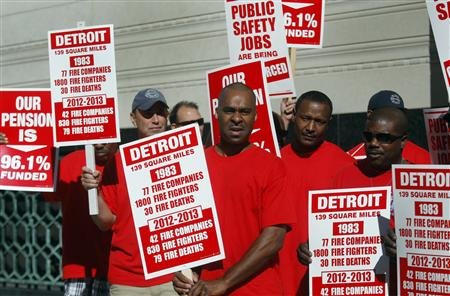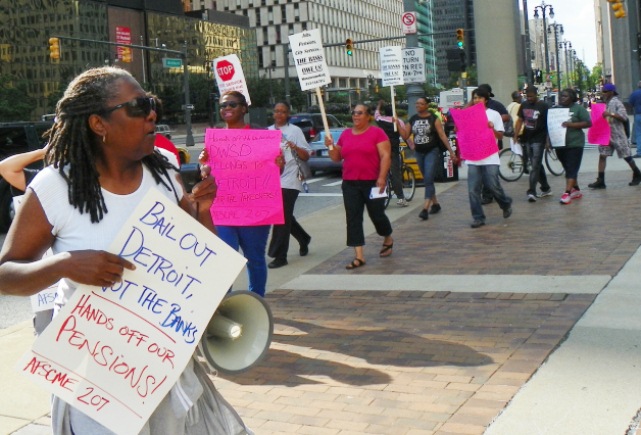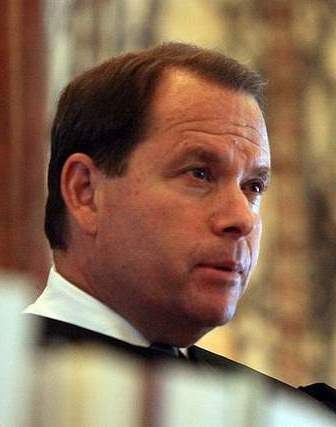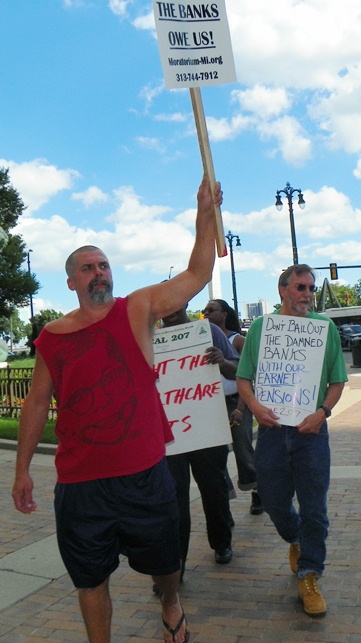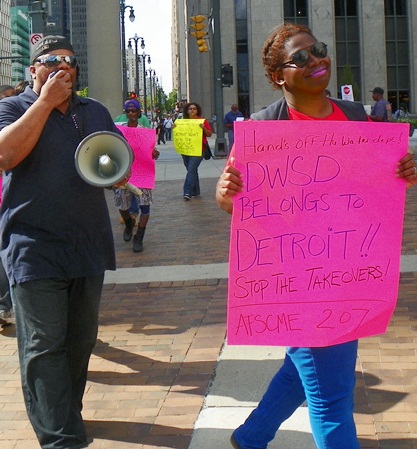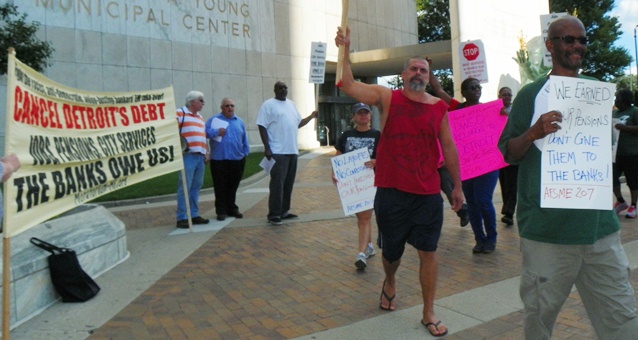
Retirees, union members and their supporters protested outside the Coleman A. Young Center July 25, 2013.
Protest planned outside federal courthouse Fri. Aug. 2, 9 a.m.
Move represents a frontal attack on retirees’ ability to defend pensions
Pension systems filed counter-motion July 31
State AG Schuette has not filed motion to protect pensions despite promise
By Diane Bukowski
July 30, 2013
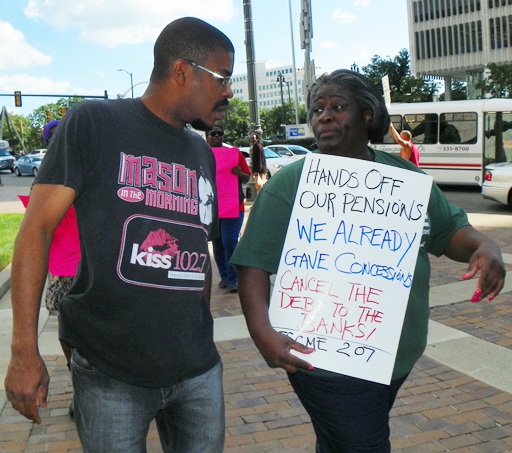
AFSCME Local 207 officer Laketa Thomas talks with another protester outside the CAYMC July 25, 2013.
UPDATE: The city’s pension systems filed a “Limited Objection” to Orr’s proposal to replace them with a retirees’ committee. Click on DB Retirement Systems limited objection to committee for full text.
In brief, the objection makes the following points: 1. The “Retirees Committee” should not be used as a “surrogate” or “straw person” to replace the Retirement Systems. 2. The Retirement Systems have “significant resources” which should not be barred from use on behalf of the retirees. 3. The Retirement Systems object to the City’s role in selecting the retirees as a conflict of interest; they should be selected by the Office of the U.S. Trustee. 4. The committee members should be paid officials. 5. Clark Hill and Greenhill, attorneys for the Retirement Systems, have participated in extensive consultations with the Retirement Systems and have also met with EM Kevyn Orr in negotiations. 5. Orr wants the committee because he claims the Retirement Systems cannot legally bind retirees. However, neither can the Retirement Committee or any other body. 6. Orr’s motion says the Retirees Commitee would be the single representative of the retirees. The Retirement Systems object that this is “an inappropriate attempt to marginalize the Retirement Systems–the city’s two largest creditors. . .in negotiating the protection of benefits . . . and the deprive the participants of the Retirement Systems of the significant resources” the systems can bring to bear.
DETROIT – Detroit Emergency Manager Kevyn Orr’s motion in the city’s bankruptcy case to for U.S. Judge Steven Rhodes to appoint a separate “Retirees Committee” that could replace the city’s elected Pension Boards will be heard this Friday, Aug. 2, 2013 at 10 a.m.
David Sole, a city retiree with the newly formed “Stop the Theft of Our Pensions Committee” (STOP) said they and others plan to protest at 9 a.m. outside the federal courthouse at 231 W. Lafayette in downtown Detroit.
Orr wants the newly-concocted committee to represent all 23,500 city retirees.
“There is still a request in front of the bankruptcy judge to appoint a creditor’s committee that will include retirees, so they will be the party that will really be representing retirees,” Michigan Governor Rick Snyder told Channel 7 in an earlier interview, making it clear that he and Orr want to eliminate the role of the pension funds in dealing with the bankruptcy.
Such a committee would not have the financial resources or expertise to fight what Orr and Snyder have made clear is their intent to raid retirees’ pensions.
The Detroit General Retirement System (DGRS) and the Detroit Police and Fire Retirement System (DPFRS) have set aside “war chests” to defend retirees in the bankruptcy case. They filed lawsuits at the state level and are currently intervening in the bankruptcy proceedings.
“The Michigan State Constitution provides protection for accrued pension benefits,” bankruptcy attorney Robert Gordon of Clark Hill, representing the pension systems, argued during the first bankruptcy case hearing July 24. He said Michigan Governor Rick Snyder thereby had no authority to authorize the bankruptcy filing, since he is sworn to uphold the state Constitution.
“The Governor cannot unilaterally abrogate the constitution. He is seeking to do indirectly what he can’t do directly,” Gordon said.
Article 9, Sec. 24 of the Michigan Constitution explicitly forbids “diminishing or impairing” public pension benefits.
The pension funds also argued earlier in their state lawsuit that the current “Emergency Manager” act, PA 436, binds any Emergency Manager as well to comply with Art. 9 Section 24.
Jones Day, the city’s consultant, argues in Orr’s motion that the boards “have no authority to amend the terms of the Retirement Systems and pension plans.” They say the authority lies with the city through amendments of the City Code, and thereby with Orr.
The motion cites Detroit City Code § 47-4-4 (“The City reserves the right to amend . . . the Plans created hereunder at any time; such amendments may include termination of the Plan.”) Click on DB retirees committee motion to read full motion. Also click on DB 8 2 13 order to read agenda for Aug. 2 hearing.
The motion also argues that both pension funds are funded at levels lower than those reported by their actuary, Gabriel, Roeder and Smith. Milliman, Inc., hired by the city last year as a consultant, has made those contentions in unpublished reports. Under Public Act 436, Orr can remove one or all the elected trustees of the pension boards if that is the case.
Detroit’s case is unique among others in the country because it is being brought by an unelected official, Orr, with no accountability to the people, in a federal forum where there are no federal statutes protecting public pensions.
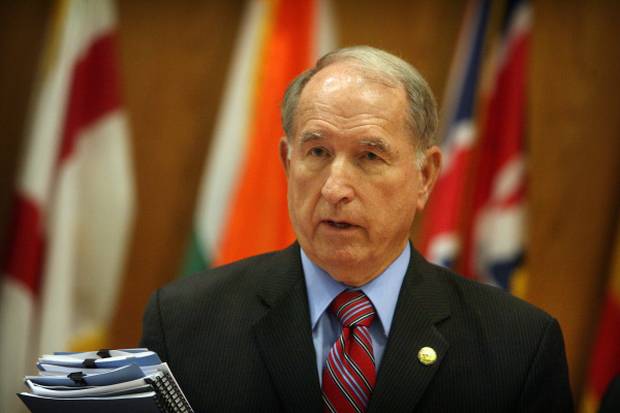
San Bernadino Mayor Pat Morris has opposed cuts to pensions as well as privatization during bankruptcy proceedings.
In the Stockton, California Chapter 9 bankruptcy case, the California Employees Retirement System (CalPERS) has been able to preserve public pensions in negotiations with the elected governments involved, while making concessions on health care. In San Bernadino, California, city officials there also held out against pension reductions.
Some union officials including Ed McNeil of AFSCME Council 25 and Dan McNamara of the Detroit Firefighters Association have misconstrued the gravity of Rhodes’ ruling, claiming it is better to be in the federal courts rather than the reactionary state courts.
After the hearing, McNeil proclaimed it a victory to retirees outside, despite the fact that AFSCME Council 25’s attorney Sharon Levine argued strenuously against the bankruptcy filing in court just hours earlier.
Judge Rhodes’ background is murky, but it is not likely that he will be any less reactionary than the state courts. He appointed U.S. District Court of Eastern Michigan Chief Judge Gerald Rosen as a mediator in the case. Rosen is a member of the arch-conservative Federalist Society. Before his appointment to the bench by President George W. Bush, he worked with Miller Canfield.
That is a likely conflict of interest, since Miller Canfield is also representing the city (i.e. Kevyn Orr) in the bankruptcy filing.
A representative for Gordon said he will be filing appropriate motion(s) on behalf of the funds before Friday to protect the pension boards, but that he cannot talk to the media until after the actions are filed. She said he takes the matter very seriously.
At a luncheon held by the Detroit Retired City Employees Association July 20, retirees were recruited to sign up for representation on some form of committee, according to several attendees. In his motion, Orr suggested that retiree associations do so.
On their website, DRCEA President Shirley Lightsey has posted a letter she sent to Orr in March asking to meet with him. She says in the letter that the DRCEA has 6500 members. Lightsey letter to Orr.
“As you can certainly imagine, retirees and beneficiaries are fearful of what may happento their pensions and medical coverage as you try to find ways to correct the financial problems of the City of Detroit,” Lightsey wrote. “We are the liaison to many of those that will be affected by your decisions; and, I feel it would be helpful and informative if you would agree to meet with myself and several Officers of the DRCEA. We understand the challenges you face and the very difficult decisions you will be required to make going forward; however, we feel it is important for us to discuss with you the very serious impact any changes will have on all retirees and beneficiaries.
“If you agree to meet, we appreciate having the opportunity to share our concerns andallowing an open dialogue before you finalize your decisions and recommendations.”
The federal bankruptcy court website lists Attorney Ryan Plecha as representing both the DRCEA and the Detroit Retired Police and Firefighters Association (DRPFA) in the case.
Don Taylor, President of the DRPFA, earlier told another station, “Most of the retirees live on a fixed income and their pension is all they have because the city of Detroit opted out of social security so the retirees only have their pensions. They are worried right now.”
His organization represents 6,000 retirees.
Taylor is listed with Lightsey as one of the intervenors represented by Plecha on the court website.
Lightsey was contacted by email for further information, but had not responded before this story went to press.
In related news, Michigan Attorney General Bill Schuette’s much publicized pledge July 26 that he would file a motion July 29 to defend retirees’ constitutional rights to their pensions did not materialize. As of July 30, no such motion had been filed according to the court’s website. Schuette only filed an appearance, although he was already represented at the July 24 hearing.
VOD earlier contacted Schuette’s press representative Joy Yearout for a copy of Schuette’s release cited in the Detroit News and Free Press, but to date has not received a response.
Orr additionally pledged in the daily media that he will not cut retirees’ pensions or health care benefits for six months, but did not cite what provision under the Bankruptcy Code allows him to make such a pledge.
Some retirees have said they feel Schuette and Orr are stringing them along to prevent an all-out fightback.
To contact STOP, the Stop the Theft of Our Pensions Committee,” call 313-680-5508 or go to www.moratorium-mi.org. Meetings of the Moratorium Now Coalition, which initiated STOP, are held every Monday at 7 pm at 5920 Second near Wayne State University.
Watch VOD for further updates on this matter, and on the fast-tracking of the bankruptcy filing.



